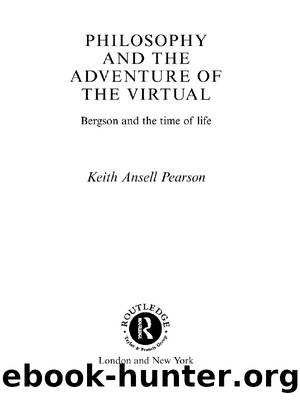Philosophy and the Adventure of the Virtual by Ansell-Pearson Keith; Ansell-Pearson Keith;

Author:Ansell-Pearson, Keith; Ansell-Pearson, Keith; [KEITH ANSELL PEARSON]
Language: eng
Format: epub
Publisher: Routledge
Published: 2011-09-11T16:00:00+00:00
Kant: the problem of teleology
For Kant teleology belongs to reflective judgement, which is to say, the concept we have of a thing as intrinsically a natural end or purpose (Naturzweck) cannot be a constitutive conception of either the understanding or of reason; rather, its conception is purely regulative in the sense that it aids the investigation of objects in terms of an analogy with ‘our own causality according to ends generally’, so providing ‘a basis of reflection upon their supreme source’ (Kant 1952: section 65, 24). It is organisms as beings of nature that can be conceived as ends in this way, and in this respect they supply natural science with the basis for a teleology. To judge objects, such as organisms, in this manner is to introduce into science a special principle of estimation that in any other terms is absolutely unjustifiable. What is this special principle? It is that which defines an organism in a specific way, namely, as ‘an organized product of nature . . . in which every part is reciprocally both end and means. In such a product nothing is in vain, without an end or purpose (zwecklos), or to be ascribed to a blind mechanism of nature’ (section 66: 24–5). Kant concedes that although the occasion for adhering to such a principle has to have some basis in experience and observation, it must have some underlying a priori character owing to the fact that it has a universality and necessity. But then he insists, once again, that this principle is solely regulative in application in which the ‘ends’ in question may only reside ‘in the idea of the person forming the estimate and not in any efficient cause whatever’. Such a principle thus provides a ‘maxim for estimating the intrinsic finality (or purposiveness) (Zweckmässigkeit) of organisms’, although such intrinsic finality does not say anything actual about real bodies or organisms but only refers to how we are trying to conceive them (25). In other words, the finality we ascribe to nature is one that is relative to our comprehension (‘man’s power of judgement being what it is’, Introduction, 3). The judgement we make of a purposive organism, or of a purposive nature, is an analogical judgement, and in this specific sense: when we bring a teleological estimate to bear on the investigation of nature and its products, and as a way of aiding scientific observation and research, we do so by analogy to a certain kind of causality that we identify with our own noumenal self, namely, a self-determining one, that is, one that sets ends or purposes (Zwecken) for itself. Kant insists that this is an estimate of the reflective and not the determinant judgement since no pretence is being made to explain anything on a constitutive or empirical level.
It is important to grasp precisely the concept of the organism Kant says we are entitled to deploy in terms of the reflective judgement. An organism is a being that can be thought not
Download
This site does not store any files on its server. We only index and link to content provided by other sites. Please contact the content providers to delete copyright contents if any and email us, we'll remove relevant links or contents immediately.
| Anthropology | Archaeology |
| Philosophy | Politics & Government |
| Social Sciences | Sociology |
| Women's Studies |
The remains of the day by Kazuo Ishiguro(8975)
Tools of Titans by Timothy Ferriss(8365)
Giovanni's Room by James Baldwin(7326)
The Black Swan by Nassim Nicholas Taleb(7106)
Inner Engineering: A Yogi's Guide to Joy by Sadhguru(6785)
The Way of Zen by Alan W. Watts(6600)
Asking the Right Questions: A Guide to Critical Thinking by M. Neil Browne & Stuart M. Keeley(5759)
The Power of Now: A Guide to Spiritual Enlightenment by Eckhart Tolle(5752)
The Six Wives Of Henry VIII (WOMEN IN HISTORY) by Fraser Antonia(5497)
Astrophysics for People in a Hurry by Neil DeGrasse Tyson(5182)
Housekeeping by Marilynne Robinson(4436)
12 Rules for Life by Jordan B. Peterson(4299)
Double Down (Diary of a Wimpy Kid Book 11) by Jeff Kinney(4261)
Ikigai by Héctor García & Francesc Miralles(4246)
The Ethical Slut by Janet W. Hardy(4242)
Skin in the Game by Nassim Nicholas Taleb(4239)
The Art of Happiness by The Dalai Lama(4125)
Skin in the Game: Hidden Asymmetries in Daily Life by Nassim Nicholas Taleb(3989)
Walking by Henry David Thoreau(3953)
